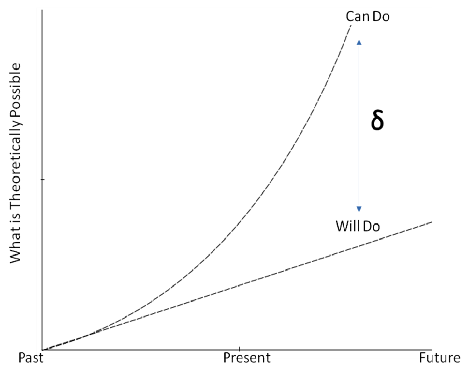By H Griffiths: Originally Published Jan 11 2018 on Medium.com
In 2011 I heard Dan Dennett, the American philosopher, writer and cognitive scientist talk at a conference in Melbourne during which he covered the topic of technology adoption.
During his talk, Dan drew a simple diagram which outlined his belief that we would increasingly face far more difficult choices as to how we use new technologies.
Below is the diagram and the notes that I took during his talk:
Dennett has postulated that as we experience a future where technologies will enable us to do far more things, we will increasingly be faced with more difficult choices as to what degree we should actually do them.
Dennett summarised his observations as follows:
In 2011 I heard Dan Dennett, the American philosopher, writer and cognitive scientist talk at a conference in Melbourne during which he covered the topic of technology adoption.
During his talk, Dan drew a simple diagram which outlined his belief that we would increasingly face far more difficult choices as to how we use new technologies.
Below is the diagram and the notes that I took during his talk:
Dennett has postulated that as we experience a future where technologies will enable us to do far more things, we will increasingly be faced with more difficult choices as to what degree we should actually do them.
Dennett summarised his observations as follows:
Today, ought implies “can”
I can’t, implies “I’m excused”
Now and increasingly: the explosion of “can do”
This will lead to the waning of excuses, and the waxing of guilt.
At the time his concept seemed a little ahead of its time. I also thought it was a great argument for organisations to hire more philosophers like Dan :-)
Books on the future of work such as Race Against The Machine by Erik Brynjolfsson and Andrew McAfee had not yet been written, gene editing had not yet been attempted in humans and it was not that easy for anyone to just buy a powerful drone on the high street and fly it into the path of a landing jet . And the list of things that are now concerning us about emerging technologies only seems to be getting longer…
So, has the time come for us to use concepts such as this one to better question the role that technology will play in our future. I don’t know if this model is contained in any of Dan’s books but I think it would be useful it gets a little more use.
Books on the future of work such as Race Against The Machine by Erik Brynjolfsson and Andrew McAfee had not yet been written, gene editing had not yet been attempted in humans and it was not that easy for anyone to just buy a powerful drone on the high street and fly it into the path of a landing jet . And the list of things that are now concerning us about emerging technologies only seems to be getting longer…
So, has the time come for us to use concepts such as this one to better question the role that technology will play in our future. I don’t know if this model is contained in any of Dan’s books but I think it would be useful it gets a little more use.

